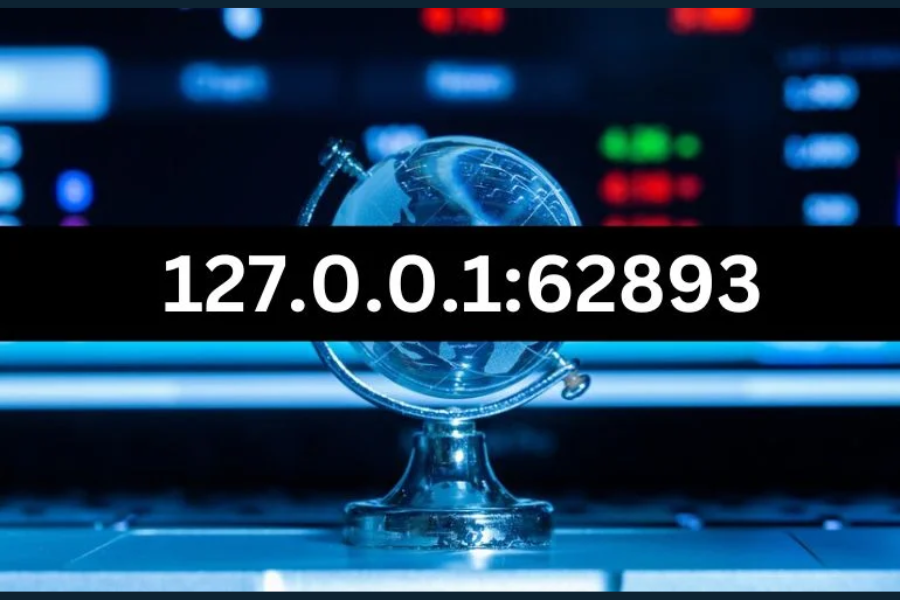Encrypted addresses like 127.0.0.1 and 127.0.0.1:62893 may seem confusing, especially when dealing with software and network development. However, this particular IP address isn’t as complicated as it may appear. Understanding its purpose can simplify your navigation, development, and use of software systems.
What is the 127.0.0.1 IP Address and 127.0.0.1:62893?
127.0.0.1 is a unique IP address known as the loopback or localhost address. It refers to the computer you’re currently working on. This address is used when someone wants to connect to a server but doesn’t know the specific IP address of the local machine. It helps resolve addresses for the local computer.
When additional numbers, like 62893, are appended to the IP address (i.e., 127.0.0.1:62893), they represent a port—a gateway that facilitates communication within the computer. These ports send and receive data to and from specific applications.
In technical terms, 127.0.0.1 with port 62893 allows the system’s software to handle incoming and outgoing messages. The IP/TCP stack ensures that all communication happens within the same device, enabling the computer to interact with itself via the loopback mechanism.
Why is 127.0.0.1 Useful?
The localhost or loopback address serves several important functions:
- Network Testing: It helps you check if your network configuration works on a particular device.
- Local Services Access: You can connect to services running on the local machine even without a network connection.
- Security: Localhost can act as a security layer, filtering messages passing through routers and preventing unwanted external access.
- Message Routing: It ensures that incoming messages are treated as if they came from an external server, even though they originate from the local machine.
- Terminal Access: Localhost allows devices to interact with each other. For instance, it can point a terminal or CPU to communicate with itself via localhost.
- Software Testing: Developers can test software on localhost before launching it to the web, ensuring everything functions as expected.
- Faster Development: By sending messages to localhost, developers get quicker responses compared to waiting on a remote server’s network speed.
- Safe Testing Environment: Localhost creates a sandbox where developers or students can experiment with new software features without risking damage to other programs.
How to Get Your Computer’s IP Address
To check your computer’s IP address, follow these steps:
- Windows Users: Open the Start menu, type CMD in the search bar, then open the command prompt. Type ipconfig to view the address.
- Linux Users: Press Ctrl + Alt + T to open the terminal, type ipconfig, and press Enter.
Copy the IP address, paste it into your browser’s address bar, and send a request to your web server. If successful, you’ll see the default Apache web page, which means you’re accessing your localhost (server).
If nothing appears, your Apache server might not be running. Restart the server and repeat the process. Keep in mind, you must be connected to the internet to connect with nearby computers.
FAQs
Can my browser make HTTP requests locally without being connected to a network?
Yes, your computer doesn’t need to be online to communicate with itself. When not connected to the Internet, it defaults to 127.0.0.1.
What’s the difference between localhost and IPv6 addresses?
Localhost refers to the primary IPv4 address (127.0.0.1), which acts as a loopback address. On the other hand, IPv6 addresses are a different internet protocol sequence. Both serve similar purposes, though IPv6 operates under a newer system.
Can I block websites using loopback addresses?
Yes, you can block websites by editing your system’s hosts file. Open Notepad as an administrator, navigate to the file, and add a line with “127.0.0.1” followed by the website’s URL. Save the file and restart your computer.
Can a system restore fix proxy issues with 127.0.0.1:62893?
Yes, performing a system restore can fix proxy issues if they’re caused by recently downloaded files or software. This will revert your system to a previous state without risking the loss of important data.
Stay informed with detailed features and updates on the hottest trends at InfoSekker.




